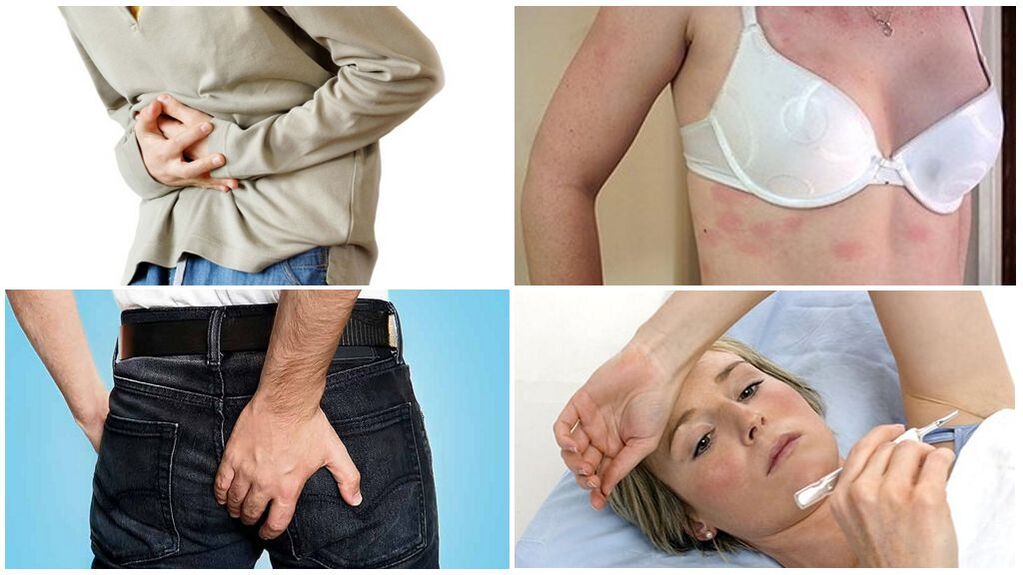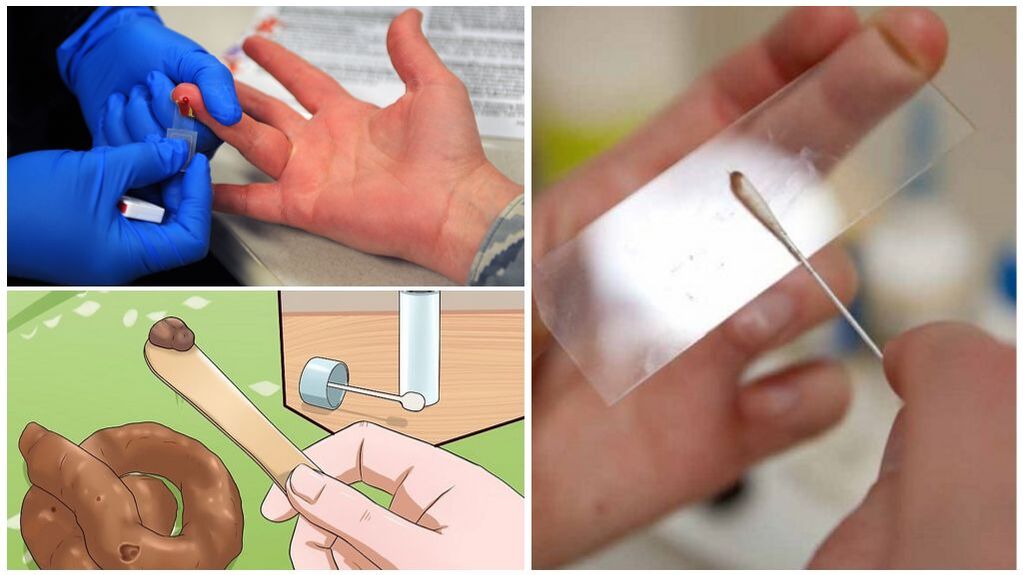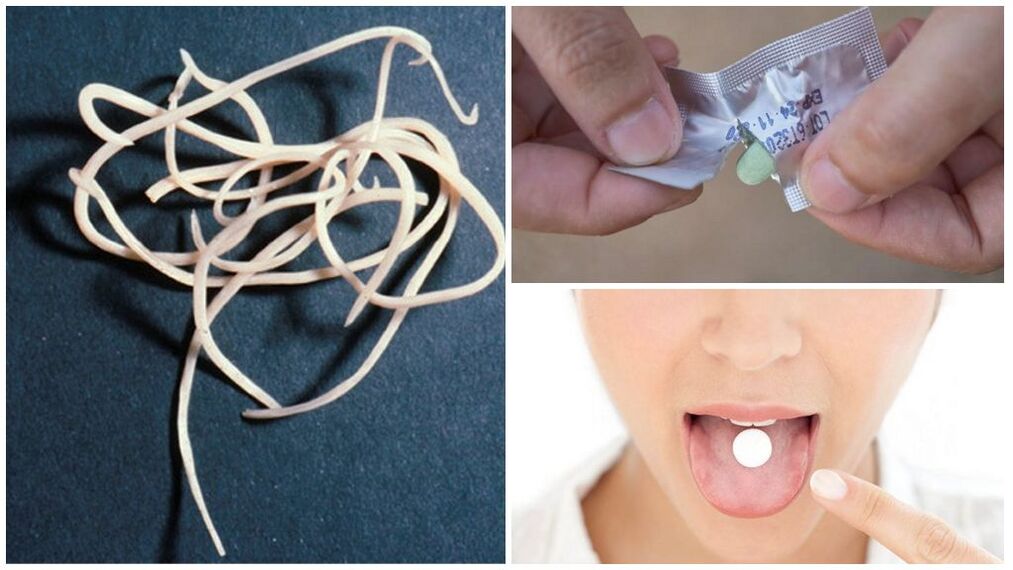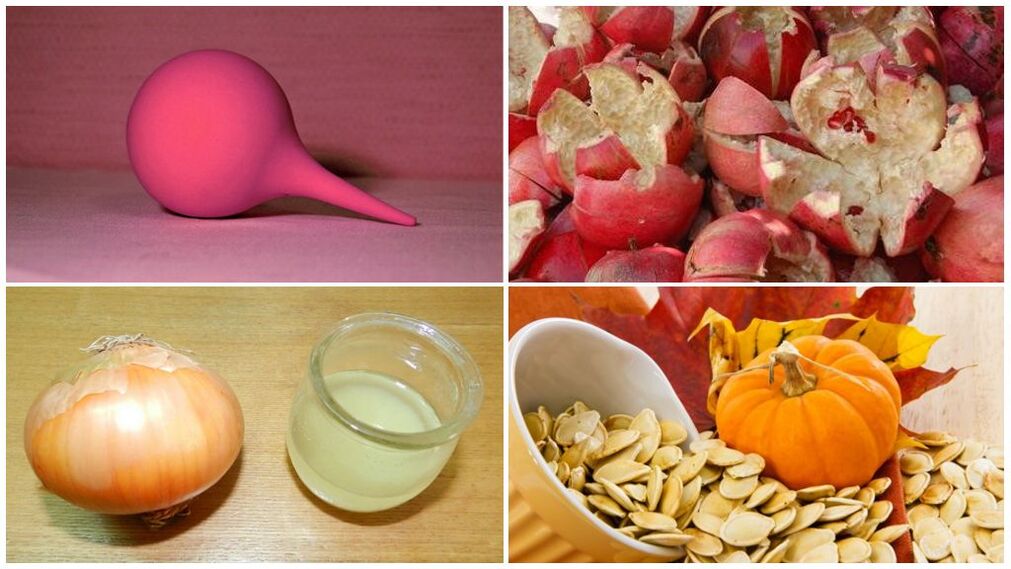Parasitic infections often go unnoticed. The first symptoms of worms in humans are not specific, so the sick person does not go to the doctor for a long time. Thus, the patient may think that he is overworked, suffering from gastritis or poisoning, experiencing an exacerbation of allergies or arthritis.
How to suspect the appearance of worms
Signs of helminths in the body depend on the type and localization of the parasite. Some symptoms appear shortly after infection. Others appear after a while and indicate the migration of worms in the body, the increase of poisoning, the lack of nutrients or vitamins.
The most common signs of worms in adults are:
- An increase in body temperature. The fever can be unexpressed - up to 37. 5 ° C, for a short time. Episodes of temperature rise coincide with periods of deterioration accompanied by the growth of various groups of lymph nodes.
- One of the most common signs of the presence of helminths is abdominal pain. Unpleasant sensations have a specific localization - in the navel, liver or movement. The pain is accompanied by violation of the stool, the appearance of impurities in the stool - mucus, blood. Diarrhea occurs more often, but blockage of the intestinal lumen by parasites is also possible.
- Itching of the anus is the first sign and characteristic symptom of pinworms. Occurs at night and forces a person to scratch the anus.
- Worms cause skin or respiratory-type allergic reactions, as their decomposition products and toxins circulate in the body. So, a person complains of exacerbation of bronchial asthma, the appearance of dermatitis, eczema.
- If infected with worms, beriberi develops. This manifests itself in the deterioration of the condition of the hair and nails, the characteristic "jam" in the corners of the mouth, and dry skin. The lack of iron in the body causes anemia, pale skin, and the appearance of bruises under the eyes.
- Helminths also have a pathogenic effect on the nervous system, as a result of which the patient suffers from headaches, irritability, decreased performance, intermittent sleep, and emotional instability.
- Worms migrating through the respiratory system (roundworms) cause a dry cough. With the movement of parasites in the muscles and the development of poisoning, sick people complain of pain, muscle and joint pain.

In a comment!
The first symptoms of infection may appear within a few days after the helminths have penetrated the body of an adult. They occur more often after 2-3 weeks from the moment of contact with the parasite, and with migrating worms - after months, years.
A combination of different symptoms does not clearly indicate a specific disease, but it is a reason to worry about your health and consult a doctor. If a sick person engages in self-diagnosis and searches for information on how to understand that he has worms, he loses time and can get life-threatening complications.
What is the danger of parasitic infection?
Helminths in the body not only absorb the necessary nutrients and vitamins from humans. Worms poison the patient with decomposition products and affect the internal organs. Human parasitic worms can lead to serious diseases that require urgent surgery and, in some cases, the removal of part of the organ:
- acute intestinal obstruction;
- violation of the integrity of the intestine with the development of peritonitis;
- appendicitis;
- obstruction of the bile ducts;
- eye damage.
Important!
The delayed consequences of invasion leading to deterioration and death of the patient include cirrhosis and liver cancer, pneumonia, pleurisy, lung tissue sclerosis, myocarditis, meningitis, hearing and vision impairment, episyndrome.
How does worm infection occur?
To solve the issue of helminth prevention, information is needed about where the parasites come from. The most common infection mechanisms are the following: nutritional, contact-household, percutaneous, infectious (related to blood-sucking insects).

Here are the most typical situations when worms appear in the body:
- Using vegetables, fruits, berries or greens contaminated with parasite eggs.
- Eating poorly cooked meat and fish with helminth larvae. Feed game that has not passed a veterinary inspection. Thus, trichinella can withstand even long-term steaming of meat and preserves its viability.
- Violation of hygiene rules: formal attitude to washing hands after returning from the street, contact with pets or street animals.
- Bathing in reservoirs containing worm larvae.
- Contact with soil containing live larvae during gardening.
- Working in conditions where the risk of worm infection is increased: in groups of children, food, animal husbandry, poultry farming.
Where are worms found in the human body
There are many medical myths about where worms live in the human body. Not all are based on parasitological data. Some helminths occupy different sections of the intestine and reproduce there. Humans can be the main host of the parasite. The so-called human worms go through the stage of sexual reproduction in the body and then leave with feces. In the case of animal worms, humans are intermediate hosts, within which only an asexual (parthenogenetic) phase is possible. Parasites spread to internal organs and damage them. So, worms can be detected in the human body:
- under the skin;
- in the liver;
- in the bladder;
- Opposite;
- in the muscles;
- in the lungs and heart;
- in the bed.
If we consider the description of the life cycle of the helminth in the form of a photo with explanations, we can trace its migration through the body and guess what the main symptoms of the disease will look like.
Diagnosis of worms
Abdominal pain, fever, skin rashes, cough with sputum, inflammatory and allergic changes in the blood count are the basis for checking a person for parasites. Infectologists recommend laboratory tests to detect the intestinal worm or the immune response to its presence in the body.

The following methods will help identify worms in a person:
- analysis of feces to detect parasite eggs;
- scraping or smear for enterobiasis;
- immunological tests to detect antibodies against helminths;
- PCR analyzes for worm DNA fragments;
- detection of the worm in the contents of the duodenum, tissue biopsy samples.
These methods help to find the type of parasite and to choose an effective drug. If the internal organs are damaged, the following will help diagnose helminths:
- Chest X-ray;
- Ultrasound of the liver, heart, pancreas;
- cystoscopy;
- MRI of the brain.
If necessary, the infectious disease specialist refers a neurologist, ophthalmologist, cardiologist, or urologist for consultation.
In a comment!
Do not try to recognize helminths on your own, but resort to "custom computer diagnostics" outside the medical institution. This leads to loss of time and deterioration of health.
Treatment of worms in humans
If an illness is detected, an infectious disease specialist will provide full recommendations regarding the treatment of the illness, treatment regimen, and diet. If necessary, the doctor recommends hospitalization. There is no single "magic" drug against worms, and the symptoms and treatment of helminths in adults may differ.
You should know the basic principles of parasite therapy:
- Medicines are used to control worms. The choice of treatment regimen (dosage, duration of the course, frequency of administration) depends on the type of helminth and the condition of the patient's body.
- In case of serious illness, help is provided in hospital conditions.
- You should not independently reduce the dose, reduce the duration of treatment with tablets or suspension of worms.
- Some medicines require a diet, refusal to drink alcohol.
- There are no "magic" remedies that will allow you to quickly get rid of helminths in 1 day. Short courses are indeed used to treat some worms in humans, but it is impossible to kill all the parasites in the body with a single pill, tincture or ointment.
- Herbal preparations are used in patients for whom medication in tablet or suspension form is contraindicated for health reasons.
- Antiallergic drugs, hepatoprotectors, enterosorbents, immunomodulators are prescribed as adjuvant therapy. By themselves, they do not help remove worms from a person, but improve the general well-being of a person, remove unpleasant symptoms of the disease and side effects of treatment.

Important!
Folk remedies are used only as an additional method of therapy. Independent use of alternative medicine is associated with deterioration.
Pharmacy funds
Treatment with drugs belonging to the group of anthelmintic drugs helps to destroy and remove parasites from the body. Pharmaceutical drugs have different points of application:
- interfere with the absorption of nutrients by parasites;
- they disrupt the worms' metabolism;
- they cause muscle paralysis of the helminths.
In a comment!
With proper use and prevention of helminthiasis in the future, anti-helminthic drugs really help to permanently get rid of parasites settled in the intestines and internal organs. But if the patient ignores basic hygiene rules, re-infection with parasites is possible.
Additionally, an infectious disease specialist may prescribe herbs to help poison and expel worms in people. Based on information about the condition of the body and the type of parasites, the doctor recommends certain herbs. Use: pumpkin seeds, tansy grass and centaury to cure the patient.
Folk remedies against worms
Many patients reject the methods of traditional therapy, hoping for the help of traditional medicine. Infectologists warn that attempts to get rid of worms at home with questionable solutions and infusions can cause increased poisoning and allergic reactions. If you miss the time, the disease progresses, death is possible.

The following home remedies are widely used to remove helminths from the body:
- onion decoction;
- pomegranate peel;
- enema and ingestion of pumpkin seeds;
- vegetable juices and sour berries without sugar;
- garlic with milk;
- soda enema;
- tincture of wormwood.
Treatment opinions
Before starting therapy, patients consider various options for the treatment of parasites, try to understand how to properly poison helminths. In their reviews, people suffering from helminthic invasion describe traditional drug therapy as a fairly effective method. It is extremely rare to get rid of helminths with folk remedies.
- "I started to worry that my anus was itchy. He turned to the therapist and was instructed to scratch. It was very unpleasant to find pinworms in the scraping. I read how dangerous helminths are and decided not to poison myself with self-medication. On the advice of the doctor, he drank anthelmintic medicine - 1 tablet once a week. The course lasted 2 weeks, I immediately felt relief, the itching was gone. I believe it wasn't such a terrible infection, but the medicine "worked perfectly fine".
- "I got worms after eating fish at a party. Soon the diarrhea started. I lost weight, my skin was dry and itchy. I studied in detail information about the treatment of parasites and the subsequent restoration of the body, I myself began to take an anthelmintic drug. I was ashamed to go to the doctor. The medicine didn't help. I tried to fight the worms with folk methods: I cleansed the liver with bitterness, drank garlic milk and did enemas. But it didn't get better. I had to see an infectious disease specialist, they treat me with an anthelmintic of the benzimidazole class. By the time I went to the doctor, I lost 4 kilos, became pale and nervous.
Prevention
Knowing how worms appear in the body, anyone can protect themselves and their loved ones from infections. Prevention includes:
- Washing hands with soap after contact with animals, upon returning home.
- Regular deworming for pets.
- Timely change of bed linen.
- Regular wet cleaning, ventilation, cleaning of carpets and upholstered furniture.
- Consumption of meat that has undergone veterinary inspection.
- Thorough heat treatment of meat and fish.
- Refusal to eat raw meat, fish, offal.
Helminth infection requires immediate treatment. You should pay attention to symptoms such as: diarrhea, abdominal pain, loss of appetite, weight loss, skin rash, cough, fever, and consult a specialist immediately. Precautions should be taken after treatment to avoid reinfection.
















































